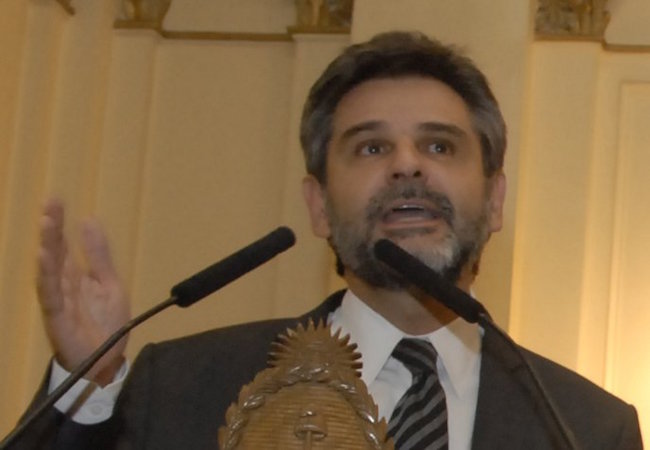Falklands/Malvinas: Argentina asks why UK is not punished for not complying with UN

Argentine diplomats questioned in Montevideo why the United Kingdom is not punished for its denial to comply with the UN General Assembly Resolution from 1965 which calls on Argentina and the UK to sit and dialogue on the Falklands/Malvinas dispute. They also denied any attempts from Argentina to suffocate the Falklands economy or hydrocarbons industry.
The head of the Argentine Foreign ministry’s Malvinas affairs Desk, Daniel Filmus was hosted on Thursday with a special session at the ALADI offices in Montevideo, as part of the 50th anniversary celebration of Resolution 2065 which recognizes the existence of a sovereignty dispute between the two countries.
ALADI stands for the Latin American Integration Association and is made up of thirteen members: Argentina, Brazil, Chile, Colombia, Cuba, Bolivia, Ecuador, Peru, Venezuela, Mexico, Panama, Paraguay and Peru. The current chairman is Carlos “Chacho” Alvarez, a former Argentine vice-president who resigned ahead of the 2001/2002 political and economic meltdown of Argentina.
“Why some countries are punished if they don’t accept UN resolutions, while others that are founding members and also have permanent seats in the Security Council can look aside and not comply with what the UN Decolonization Committee reiterates year after year?” asked Filmus following the special session and unveiling of a commemorative plaque and a Malvinas hall in the ALADI Montevideo building.
Filmus said it was hard to understand why the UK had not sat to dialogue with the Argentine government to address the issue, as established by the UN General Assembly resolution: “How can it be that the UK refuses to comply with the United Nations”, he insisted.
Filmus also made comments on the recent decision by the Argentine justice to embargo British, US and European companies’ assets for their involvement in the exploration and exploitation of hydrocarbons in the Falklands/Malvinas Islands without the consent of the Argentine government that claims the Islands and adjoining maritime spaces where the exploration for oil and gas with Falklands’ awarded licenses it taking place.
“We are not intent in isolating or suffocating economically the Malvinas Islands, but simply want to exercise our rights, and our rights are sovereignty over the Islands” underlined Filmus regarding the UK government claims that Argentina wanted to ‘strangle’ the Falklands economy and the development of the Islanders’ hydrocarbons industry.
The Argentine official said that there were three main important pending questions in the region: Panama canal sovereignty, US and Cuba relations and the Malvinas dispute, and now “two of them have been accomplished, only the third one is waiting to be resolved”.
“We need the solidarity of the all Latin American countries, as in the other two cases to overcome the long standing controversy over the Malvinas Islands”
ALADI chair Alvarez pointed out that “the Malvinas Islands claim is inexorably becoming a Latin American cause”. He added that nowadays colonialism is condemned by all countries in the world and “only 17 of these cases have survived so far, of which ten are linked to the UK”.
Alvarez also warned how dangerous is was to have in Latin America ‘a foreign power’ occupying part of ‘our territory’ and underlined the importance of ensuring that “our resources” are preserved to the benefit of the Latin American community.
Finally the president of the ALADI representatives council, Felix Rivas Alvarado read a message from Venezuelan president Nicolas Maduro expressing full support and solidarity with “Argentina’s legitimate claim over the Malvinas”.




